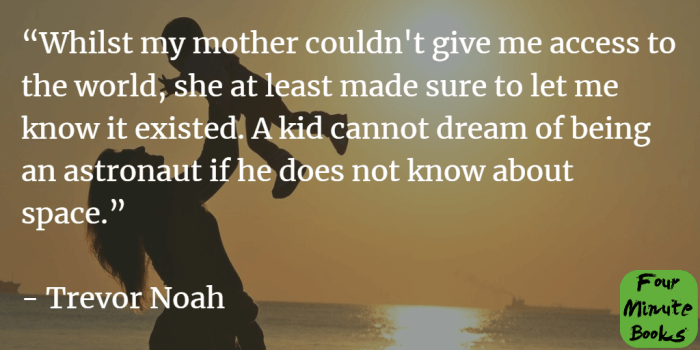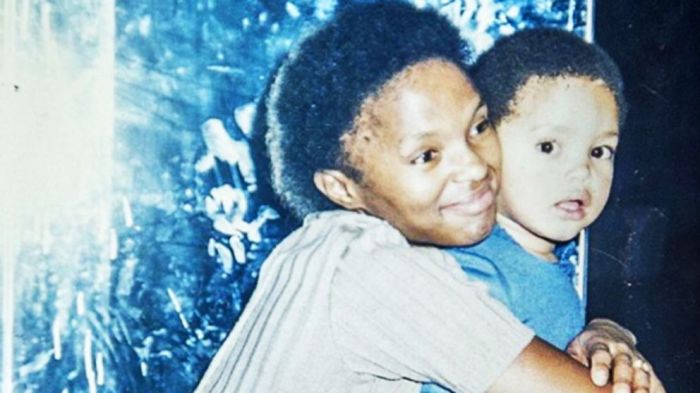Born a Crime Chapter 15 Summary: Delve into the complexities of Trevor Noah’s identity crisis, family dynamics, educational experiences, and search for belonging. Explore the chapter’s profound themes and symbolism, uncovering the challenges and triumphs of marginalized communities.
In this chapter, Trevor Noah confronts his racial and cultural identity, navigating societal pressures that shape his self-perception. His experiences challenge traditional notions of race and belonging, while his relationship with his mother and family influences his sense of identity.
Trevor’s Identity Crisis
Trevor Noah’s memoir, “Born a Crime,” delves into the complex and often contradictory nature of his racial and cultural identity. Growing up in post-apartheid South Africa, Trevor faced constant societal pressures that shaped his self-perception and challenged traditional notions of race and belonging.
Internal Conflict
Trevor’s internal conflict stemmed from his mixed-race heritage. As the son of a white Swiss father and a black Xhosa mother, he did not fit neatly into any of the racial categories defined by apartheid society. This led to feelings of alienation and confusion, as he struggled to find his place in a world that seemed to be divided along racial lines.
Societal Pressures
The societal pressures that shaped Trevor’s identity were pervasive. In apartheid South Africa, racial segregation and discrimination were deeply ingrained in every aspect of life. Trevor was constantly reminded of his “otherness” by the color of his skin, the language he spoke, and the neighborhood he lived in.
These experiences reinforced the idea that he was not fully accepted by either the black or white communities.
Challenging Traditions
Trevor’s experiences challenged traditional notions of race and belonging. His mixed-race heritage forced him to confront the arbitrary nature of racial categories and the fluidity of identity. Through his own journey of self-discovery, Trevor came to embrace his unique heritage and to reject the limitations imposed by society’s expectations.
The Role of Family

Trevor Noah’s family plays a pivotal role in shaping his identity and experiences. His mother, Patricia, is a complex and influential figure in his life. Despite facing numerous challenges, their bond remains strong and unwavering.
Patricia Noah: A Complex Matriarch
- Patricia’s resilience and determination inspire Trevor, demonstrating the power of perseverance in the face of adversity.
- Her unwavering love and support provide a safe haven for Trevor, allowing him to explore his identity and pursue his dreams.
- However, Patricia’s own struggles and past experiences sometimes create misunderstandings and conflict between her and Trevor.
Challenges and Triumphs of Family
Trevor’s family faces numerous challenges, including poverty, racism, and societal expectations. However, they also experience moments of joy and triumph:
- Despite financial struggles, the family creates a loving and supportive environment where Trevor can thrive.
- They navigate racial discrimination with courage and dignity, instilling in Trevor a sense of pride in his heritage.
- Through their unwavering support, the family helps Trevor overcome obstacles and achieve his goals.
Family’s Influence on Identity
Trevor’s family significantly influences his sense of identity and belonging:
- Patricia’s Xhosa heritage and cultural traditions instill in Trevor a deep connection to his African roots.
- The family’s experiences of racism and discrimination shape Trevor’s understanding of the world and his place in it.
- The love and support of his family provide Trevor with a strong sense of belonging and self-acceptance.
Education and Opportunity: Born A Crime Chapter 15 Summary

Trevor’s educational journey was marked by both opportunities and obstacles. Despite the challenges of his early childhood, he found support in teachers who recognized his potential and encouraged his academic pursuits. However, the systemic barriers faced by marginalized communities in South Africa persisted throughout his schooling.
Access to Quality Education
Trevor’s access to quality education was limited by the apartheid system, which allocated resources unequally based on race. The schools in his township were underfunded and overcrowded, lacking basic facilities and qualified teachers. Despite his academic abilities, Trevor faced discrimination and prejudice from some teachers who doubted his capabilities.
Chapter 15 of Trevor Noah’s “Born a Crime” paints a vivid picture of life in post-apartheid South Africa. While the struggle for racial equality had been won, the legacy of discrimination lingered, as seen in the Dean v. Utica Community Schools case.
Yet, the spirit of resilience and hope shines through, echoing the transformative power of education in Noah’s own story.
Role of Education in Shaping Aspirations
Education played a pivotal role in shaping Trevor’s aspirations. Through his teachers and mentors, he discovered a love of learning and a belief in his own abilities. Education provided him with the knowledge and skills to navigate the challenges of his environment and envision a better future for himself.
Reflecting Broader Challenges
Trevor’s experiences reflect the broader challenges faced by marginalized communities in accessing quality education. Systemic inequalities, such as poverty, discrimination, and lack of resources, continue to limit the educational opportunities available to many students from disadvantaged backgrounds.
The Search for Belonging

Throughout his life, Trevor Noah has grappled with the challenge of finding a sense of belonging. As a mixed-race child growing up in South Africa during apartheid, he faced discrimination and prejudice from both the white and black communities. This left him feeling like an outsider in both worlds.
As a teenager, Trevor moved to Johannesburg in search of a more accepting environment. He found a sense of community among the skateboarding subculture, where he was embraced for his individuality and talent. However, he still struggled to fully integrate into South African society due to the lingering effects of apartheid.
The South African Identity, Born a crime chapter 15 summary
Trevor’s experiences in South Africa highlight the complexities of navigating multiple cultural identities. He identified as both black and white, but he did not feel fully accepted by either community. This left him with a sense of alienation and a desire to find a place where he could truly belong.
The Search for Acceptance
Trevor’s search for acceptance led him to explore different communities. He spent time in the United States, where he was initially drawn to the African-American community. However, he found that he did not fully identify with their experiences and perspectives.
He also explored the white American community, but he again felt like an outsider.
Finding Belonging in Comedy
Ultimately, Trevor found a sense of belonging through comedy. He discovered that he could use his unique perspective and experiences to make people laugh and bring them together. Comedy allowed him to connect with people from all walks of life and to create a sense of community.
Themes and Symbolism

Chapter 15 of “Born a Crime” explores a multitude of themes that resonate with the experiences of marginalized communities. Through the use of powerful symbolism and imagery, Trevor Noah conveys the challenges of identity, the complexities of family, and the search for belonging.
Symbolism of the Crossroads
The crossroads, a recurring symbol throughout the chapter, represents the pivotal moments and decisions that shape Trevor’s identity. The crossroads where he is conceived symbolizes the intersection of his diverse heritage and the subsequent challenges he faces as a mixed-race child.
It also represents the choices he makes as he navigates the complexities of his life, such as choosing to embrace his South African identity despite the potential risks.
Expert Answers
What is the main conflict Trevor faces in Chapter 15?
Trevor grapples with his racial and cultural identity, questioning his place in society and challenging traditional notions of race and belonging.
How does Trevor’s family influence his sense of identity?
Trevor’s relationship with his mother and family shapes his self-perception, providing both support and challenges as he navigates his identity.
What role does education play in Trevor’s life?
Education offers Trevor opportunities and challenges, shaping his aspirations and future prospects while also reflecting the broader challenges faced by marginalized communities.